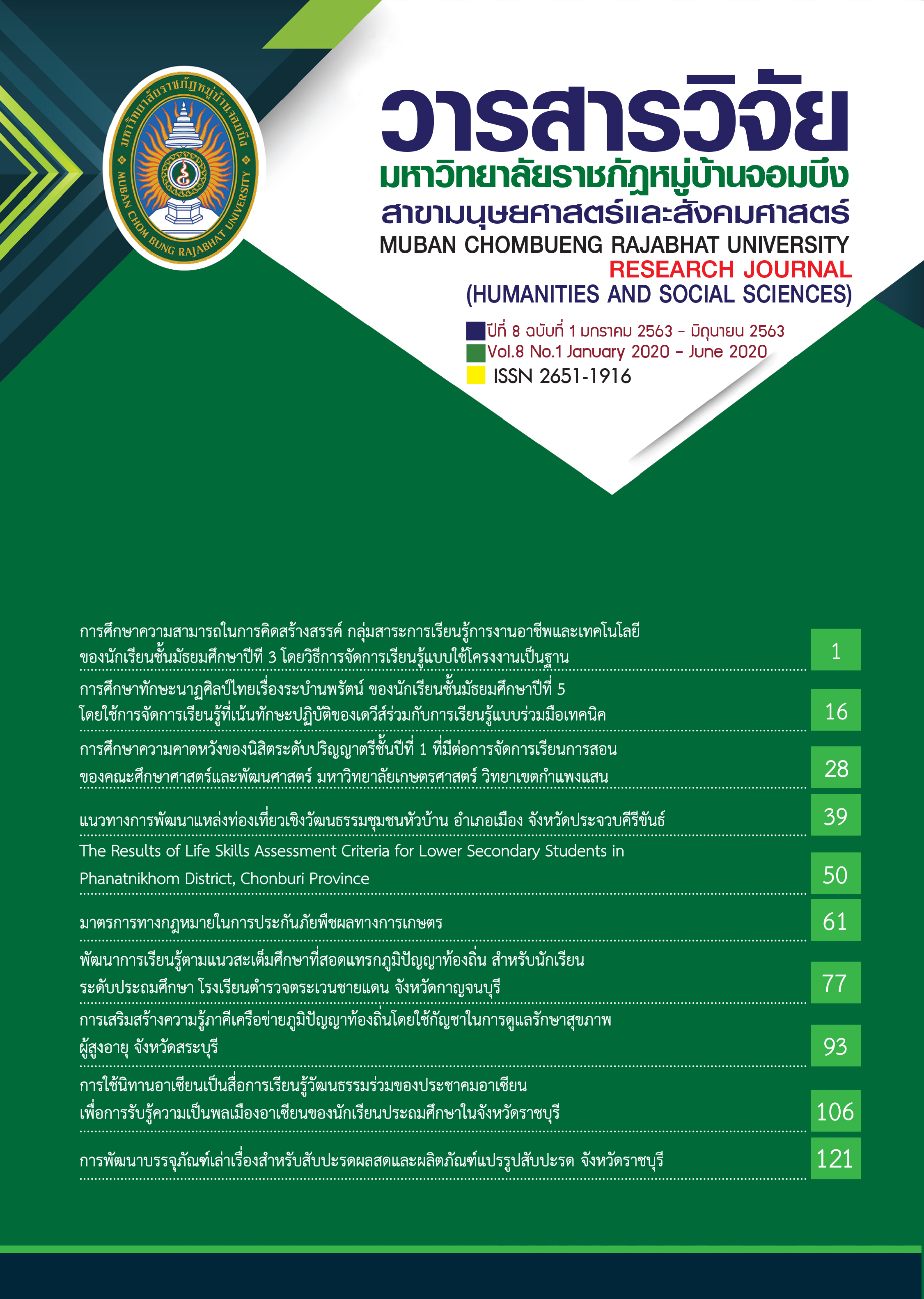The Results of Life Skills Assessment Criteria for Lower Secondary Students in Phanatnikhom District, Chonburi Province
คำสำคัญ:
Assessment criteria, Life skills, Lower secondary studentsบทคัดย่อ
The objectives of this survey research were to analyze the results of life skills assessment criteria, and to compare the results of life skills assessment criteria for lower secondary students in Phanatnikhom District, Chonburi Province, classified by genders, ages, and grade levels. A sample of 90 students was selected by random sampling. The research instrument used was the life skills assessment criteria for lower secondary school students by Kitjarat, Makmee, and Pradujprom (2018) using Google Forms to collect the data, which were analyzed by descriptive statistics such as arithmetic mean, standard deviation, percentage, Testing Group Differences using T-tests, ANOVA, and Nonparametric Measures. The results were shown as follows: 1) The results of the life skills assessment criteria for lower secondary students in Phanatnikhom District, Chonburi Province were composed of 10 elements, and overall life skills were at an excellent level, namely decision making, problem solving, creative thinking, critical thinking, effective communication, interpersonal relationship, self-awareness, empathy, coping with emotions, and coping with stress. 2) The life skills assessment criteria for lower secondary students comparison classified by genders, ages, and grade levels showed no significant difference between life skills levels.
เอกสารอ้างอิง
Erawan, P. (2010). Developing Life Skills Scale for High School Students through Mixed Methods Research. European Journal of Scientific Research, 47(2), 169-186.
Gay,L.R. (1996). Educational Research: Competencies for Analysis and Application (6th ed.). New Jersey: Prentice Hall,Inc.
Kunsinee Punya-apiwong and Narin Sungrugsa (2015). Life Skills for self-Determining Based on Sufficiency Economic Philosophy of Bachelor’s Degree Student in Silpakorn University. Veridian E-Journal Silpakorn University, 8(1). 138-152.
Nasasiusa Bussabokkaew, Athiwat Jiawiwatkul, Nonthasruang Kleebpung and Dalapat Yossatorn. (2018). Project-Based Learning and Life Skills of High School Student: A case Study of a Welfare Education School. Kasem Bundit Journal, 19(Special).
National Institute for child and family development Mahidol University. (2012). Understanding conscious teens. Retrieved March 5, 2018, from http://www.factsforlifethai.of.mahidol.ac.th/home/index.php
Pallant, J. (2013). SPSS Survival Manual: A Step by Step Guide to Data Analysis Using the SPSS Program (5th ed.). Maidenhead, Berkshire, England: McGraw-Hill.
Patcharaporn Thabmali and Charoonsri Madiloggovit. (2016). Factors affecting the efficiency of leisure time use among lower secondary school students to develop life skills. An Online Journal of Education, 11(4), 531-541.
Polit, D. F., Beck, C.T. (2007). Focus on Research Methods Is the CVI an Acceptable Indicator of Content Validity? Appraisal and Recommendations. Research in Nursing & Health, 30, 459-467.
Saknakorn Sihokaeo, Punnawit Baikularb and Aumporn Lincharoen. (2015). A Teaching Model to Develop Life Skill for Secondary School Students in Extended Schools. Humanities and Social Sciences Journal of Graduate School, Pibulsongkram Rajabhat University, 9(1), 53-66.
The Commission improving of statistics and scientific research for health. (2009). Statistics and Research in Health Sciences. (7th ed.). Bangkok: Sukhothai Thammathirat Open University.
Wiraya Kitjarat, Pattrawadee Makmee and Piyathip Pradujprom. (2018). Development of Life Skills Assessment Criteria for Vocational Student: A Multilevel Model Analysis Using Mixed Methods. Journal of Southern Technology, 11(1), 41-50.
World Health Organization. (1997). Life skills education for children and adolescences in school. Geneva: Programme on Mental Health.
ดาวน์โหลด
เผยแพร่แล้ว
รูปแบบการอ้างอิง
ฉบับ
ประเภทบทความ
สัญญาอนุญาต
วารสาร TCI อยู่ภายใต้การอนุญาต Creative Commons Attribution-NonCommercial-NoDerivatives 4.0 International (CC BY-NC-ND 4.0) เว้นแต่จะรุบุไว้เป็นอย่างอื่นโปรดอ่านหน้านโยบายของเราสำหรับข้อมูลเพิ่มเติมเกี่ยวกับการเช้าถึงแบบเปิด ลิขสิทธิ์ และการอนุญาต



